Sufia Tippu said:
“Blogging is hard because of the work it takes to stay interesting and relevant.“
Indeed, creating quality content for a blog is not an easy task. As a content creator (me too????), I must admit that there are several factors that must be taken into account.
And one of the most important, but still unclear, is the ideal length or size of content to have maximum impact or performance.
On the one hand, some statistics show that only long articles are likely to rank higher and receive more shares.
To illustrate, SEMrush reports that an article of 3,000+ words is 4 times more shareable than a short article of 300 to 900 words.
On the other hand, web marketing professionals argue that to convey certain information on the web, a short article is best suited.
This suggests quite a bit of confusion on the question of know the optimal number of words a blog post should have. ????
To do this, I tried to delve into the subject and I invite you to read this article carefully to find out what the experts say on this subject and how to go about it.
Table of Contents
ToggleChapter 1: What is a blog post?
Before tackling the real answer to our problem, it is important to first understand what a blog article is and the different sizes of articles that can be found.
A blog article is a text of 300 to more than 2000 words written on a specific subject or theme and published on a website in the “blog” section.
Generally, a blog post is educational in nature, and can include several other types of media content such as:
- Infographics;
- Illustrative images;
- Videos ;
- Etc.
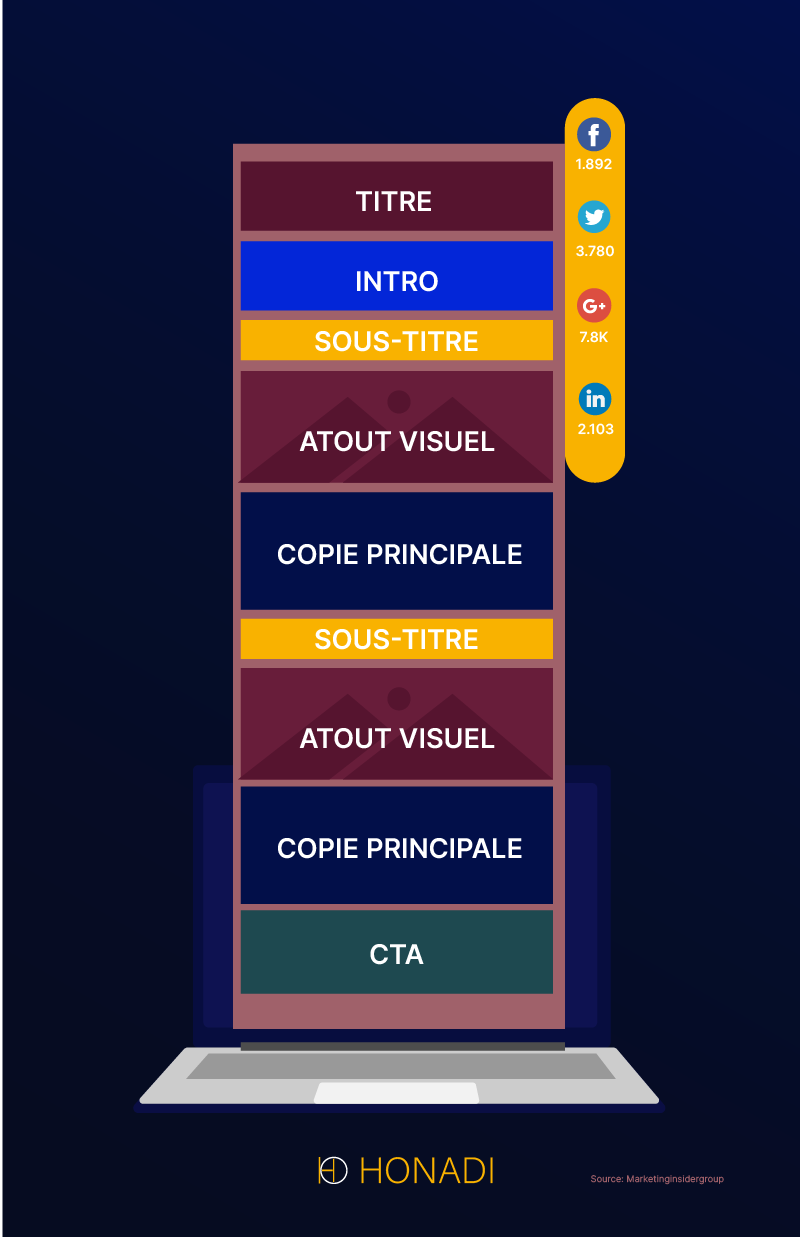
Sometimes, a blog post can also be a channel of visibility for any person or company who wants to talk about them or their services. She will then be able to share ideas with her audience via the blog in order to gain notoriety, increase her credibility and her income.
Technically, having a blog is one of the easiest tasks in web marketing. However, things can get a little more complicated when you want to profit or achieve certain goals with the content you create and publish. ????
In general, you will need to pay attention to points such as:
- The search for topics that align with your theme and your objectives;
- The creation of relevant content, reliable and quality;
- Content optimization for SEO;
- Content promotion;
- Maintaining a publication frequency;
- Etc.
Yes, that’s a lot ????. But these are factors that can impact the success or failure of your strategy. This is why we must seek to optimize each content as much as possible in order to maximize its impact and performance.
As for their size, here’s a quick comparison that will give you an idea of the pros and cons of having one or the other type of content.
Chapter 2: Short article VS long article – Which is more efficient?
Which of these types of content works best? Let’s do a little comparison.
2.1. Short blog post: Pros and cons
How many words can an article be considered short? According to several sources, a blog article must have a minimum of 300 words to be considered by search engines.
That said, it should be noted that there are no precise limits that characterize short articles from long ones. All it takes is a quick Google search to see this:
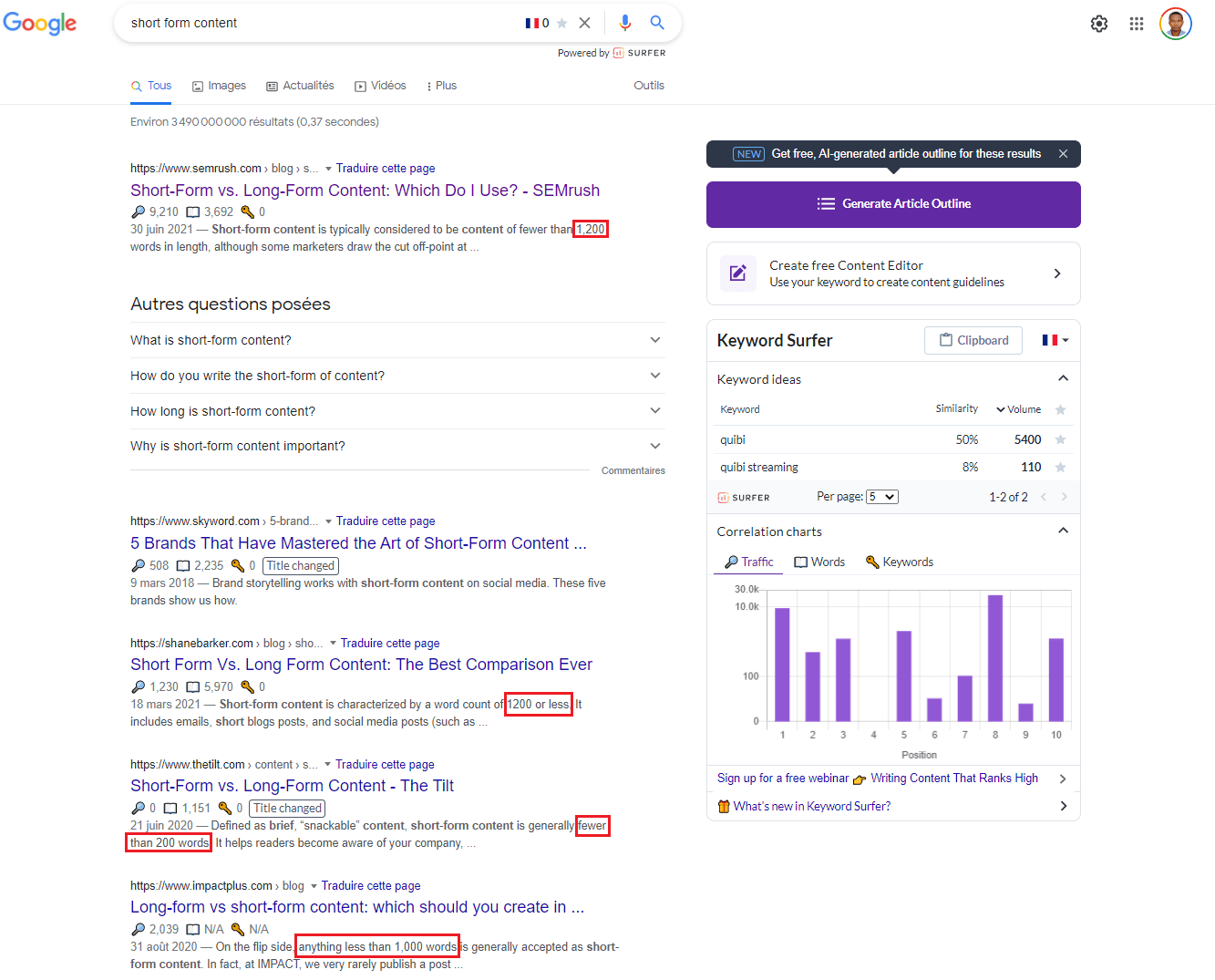
But on average, we can therefore agree that a Small content can contain up to 800 words.We will come back to this later ????
2.1.1. The advantages of writing a short article
The advantages of writing a short text can be summarized in three essential points:
- A short article is easier to create on a regular basis;
- A short blog post reads faster;
- A short article gives writers time to be more productive.
If we have to address each point in depth, we will simply say that creating short content does not require enough information research on the part of the writer.
Since these are contents that are created quite easily, the big advantage is that you can establish a well-lived editorial calendar with relatively more frequent content publications.
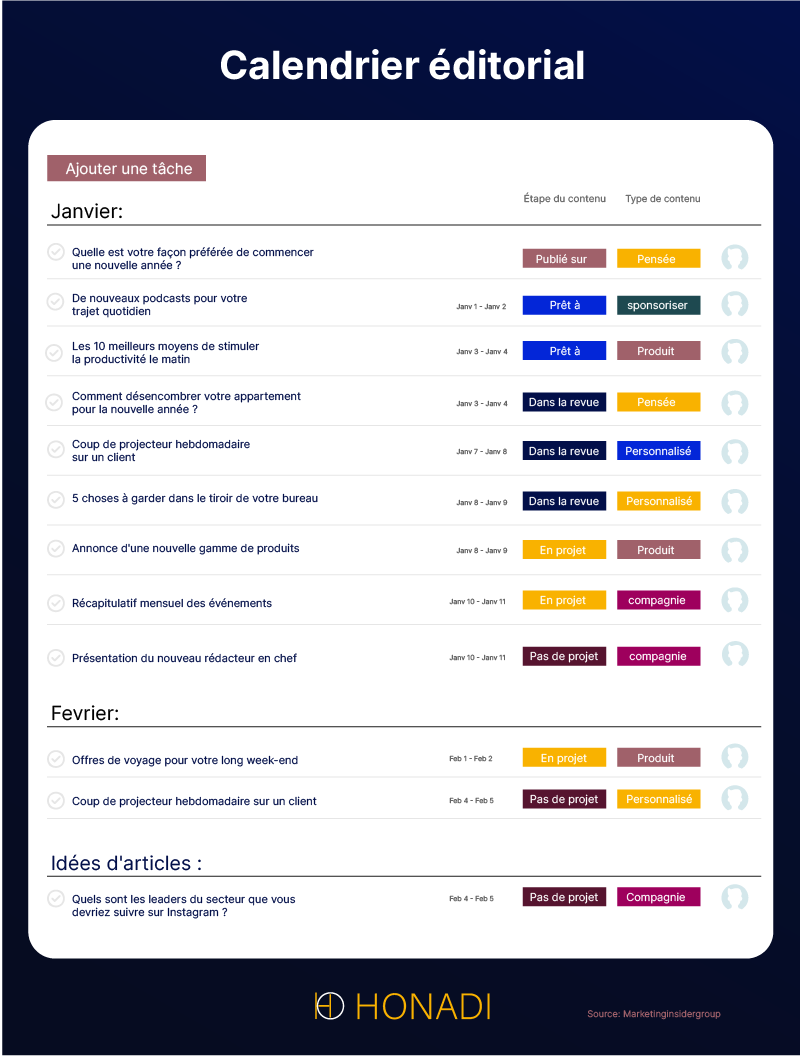
Instead of spending days on a single article (long article), you can create and publish one or more short articles each day.
This allows you to stay very close to your readers, to share with them a variety of ideas on a daily basis and to become an information reference in their eyes.
In addition, this ability to produce content frequently is an asset from an SEO point of view. In SEO, the most active blogs are more likely to appear in search results.
The fact is that search engines, notably Google, more often prioritize recent content to guarantee current information to their users.
Also, note that short content is generally easier to manage unlike large articles.
Indeed, the fact that they are short makes it possible to have simpler plans to develop with rather easy proofreading. Which makes this type of content more accessible even to people who are not professional writers. ????
2.1.2. The disadvantages of writing a short article
Just like the advantages, the disadvantages of writing a short article can be summarized in three points:
- Search engines cannot as easily discern the context of the content on your page;
- Fewer words means fewer keyword ranking opportunities;
- On certain complex themes, short content may not be sufficiently detailed to bring the reader to a complete understanding of the concept developed.
The first disadvantage of short articles is that short articles do not rank as easily in search engines as long articles.
To rank a page, Google takes into consideration certain factors such as keywords and semantic field, which it is not easy to decipher in a short article.
And if your content is way too short, it can be considered “Thin Content” :
https://honadi.com/wp-content/uploads/2023/02/calendrier-editorial.png
With this type of content, you risk experiencing Panda algorithm penalties the Google :
Wishing to offer readers the most relevant and complete answers possible, Google does not hesitate to highlight relatively dense articles, because they give readers the opportunity to go more in-depth on the subject.
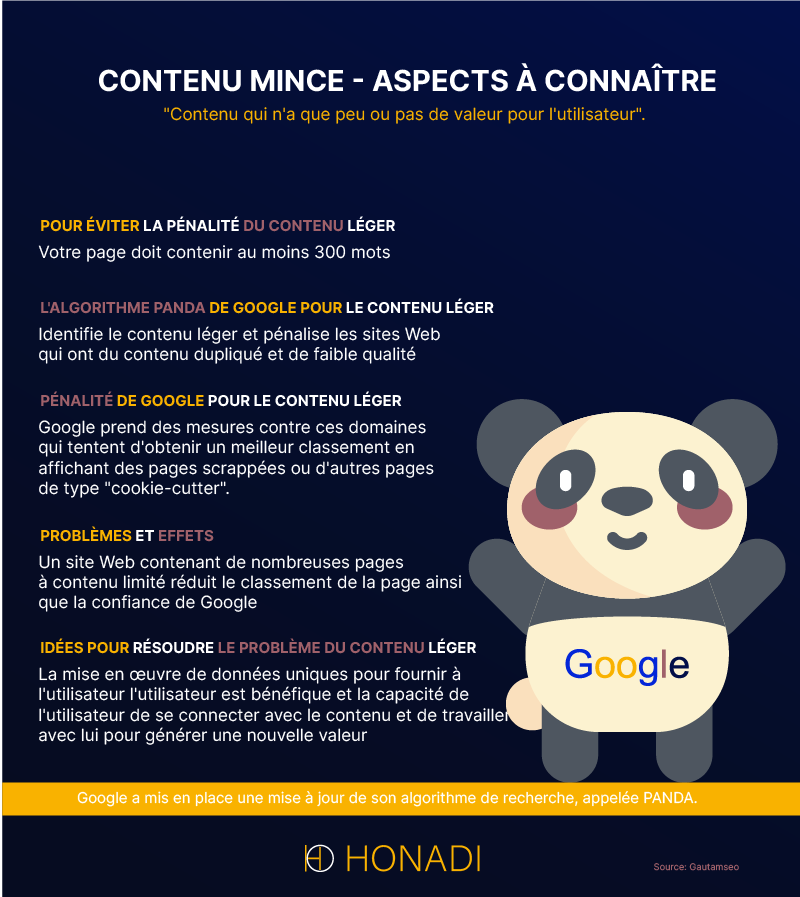
2.2. Long blog post: Pros and cons
Long-form content is usually at least 1,000 to 5,000 words and can go well beyond that. Now let’s look at its advantages and disadvantages.
2.2..1. The advantages of a long article
Nowadays, a well-written, long-form article is what Google and readers want because they can better find and understand the topic of their query.
There are a lot of benefits to a long blog post and here are a few:
Advantage 1: Allows you to have a dwell time or a long duration on the longer page
Unlike shorter posts, long-form posts give bloggers the opportunity to go in-depth on a topic.⚓
Not only do these types of articles promise to improve your SEO, but they also give you the opportunity to sufficiently expand on your topic.
The more compelling and longer your blog content is, the more time visitors will spend on the content page.
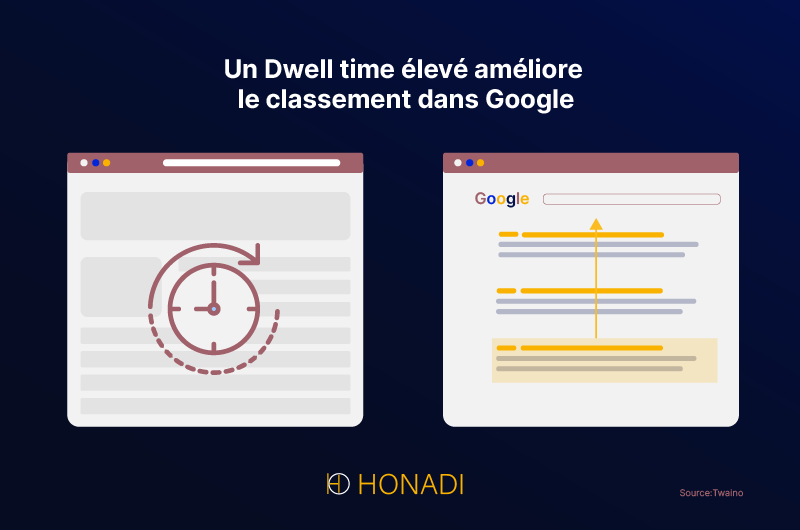
According to Neil Patel, visitors stay on pages with large content 40 % longer than on short content pages and they view 25% more pages than short content visitors.
Another tip to extend your dwell time and at the same time convert visitors to your blog is to collect their email address via an exit intent pop-up window.
An exit intent pop-up monitors the visitor’s movements and sends them a message that encourages them to subscribe when they are about to leave the website.
Advantage 2: Allows you to have more social shares
According to several studies, content with a slightly longer reading time gains more social shares.
QuickSprout illustrates this by one of its studies which reveals that articles of less than 1,500 words gain approximately 174.6 tweets and 59.3 likes on Facebook unlike articles of more than 1,500 which record at least 239.5 tweets and 72 .7 likes.
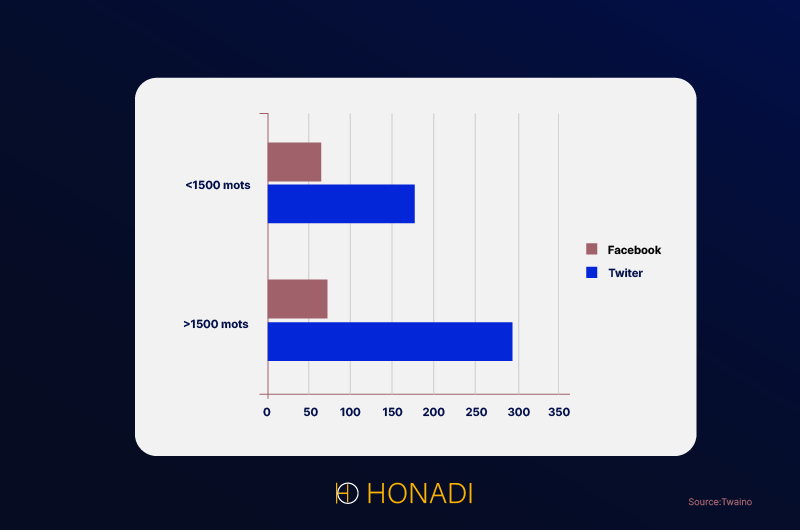
We can therefore clearly deduce that when blog content has a size greater than 1,500 words, it gains 68.1% additional tweets and 22.6% Facebook likes, compared to content below 1 500 words.
With more shares on social media, you are likely to attract more backlinks and readers to your blog, which can also make your content go viral. ✨
Benefit 3: Improves ranking in search engine results
For your website to attract the attention of search engines, you will need to optimize your blog articles for SEO.
Typically, optimizing a blog post includes:
- Research and use of valuable keywords;
- Creating readable URLs;
- The introduction of internal links;
- Etc.
When you write a long article, you have a lot of room to enrich your content and better reflect Google’s main ranking factors.
Statistics show that for most Google searches, the top 10 results only contain texts of around 2,000 and 2,500 words.
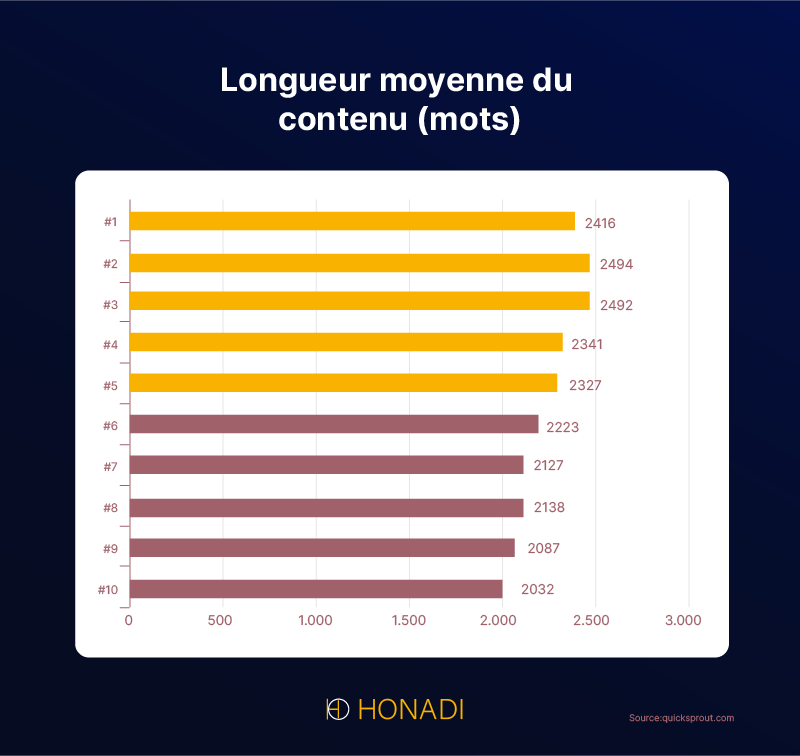
Presumably, writing large articles will improve your SEO ranking so that more users can find your content online.
Advantage 4: Generates 7 times more leads than a short article
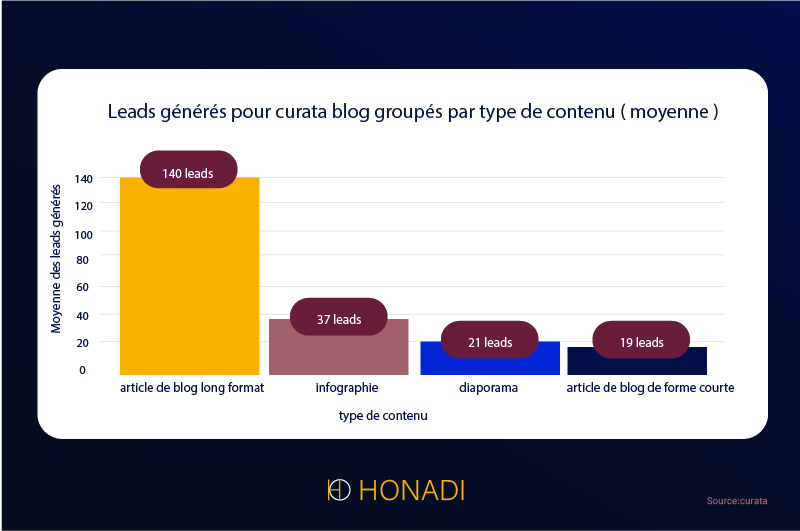
Since long-form articles are able to delve deeper into the topic, they are more likely to offer more value to users.
As a training chain, this creates a desire to make decisions among them. They can decide to:
- Subscribe to our newsletter ;
- Sign up for a free trial;
- Book a call;
- Or even move on to purchasing.
In addition, due to their length, large articles give you more opportunities to insert calls to action.
As a result, the regular usage interaction you receive will increase your SERP rankings and your site’s conversion rate.
Advantage 5: Generates more engagement
A study by Moz and BuzzSumo of 1 million articles revealed that, unlike short articles, long articles were more:
- Shared;
- I like it;
- And received more backlinks.
That said, long articles are more likely to attract user attention and engagement.
2.2.2 The disadvantages of a long blog post
The main drawback with long blog posts is the writing. When the article must contain thousands of words, the writer is exposed to the risk of making enough errors without realizing it. In addition, when the writer does not have good experience in the field, he has enough difficulty developing a plan and structuring the text well.
Personally, I regularly create content of 5,000 words, but sometimes I create content ranging from 10,000 to more than 20,000 words. ???? From experience, I admit that creating these types of content is a real challenge, especially in terms of structuring and organizing information.
Managing such a quantity of information in order to have quality content that maintains the reader’s attention throughout is not the job of an average or novice writer. ????
Here is a summary of the benefits of both types of content:
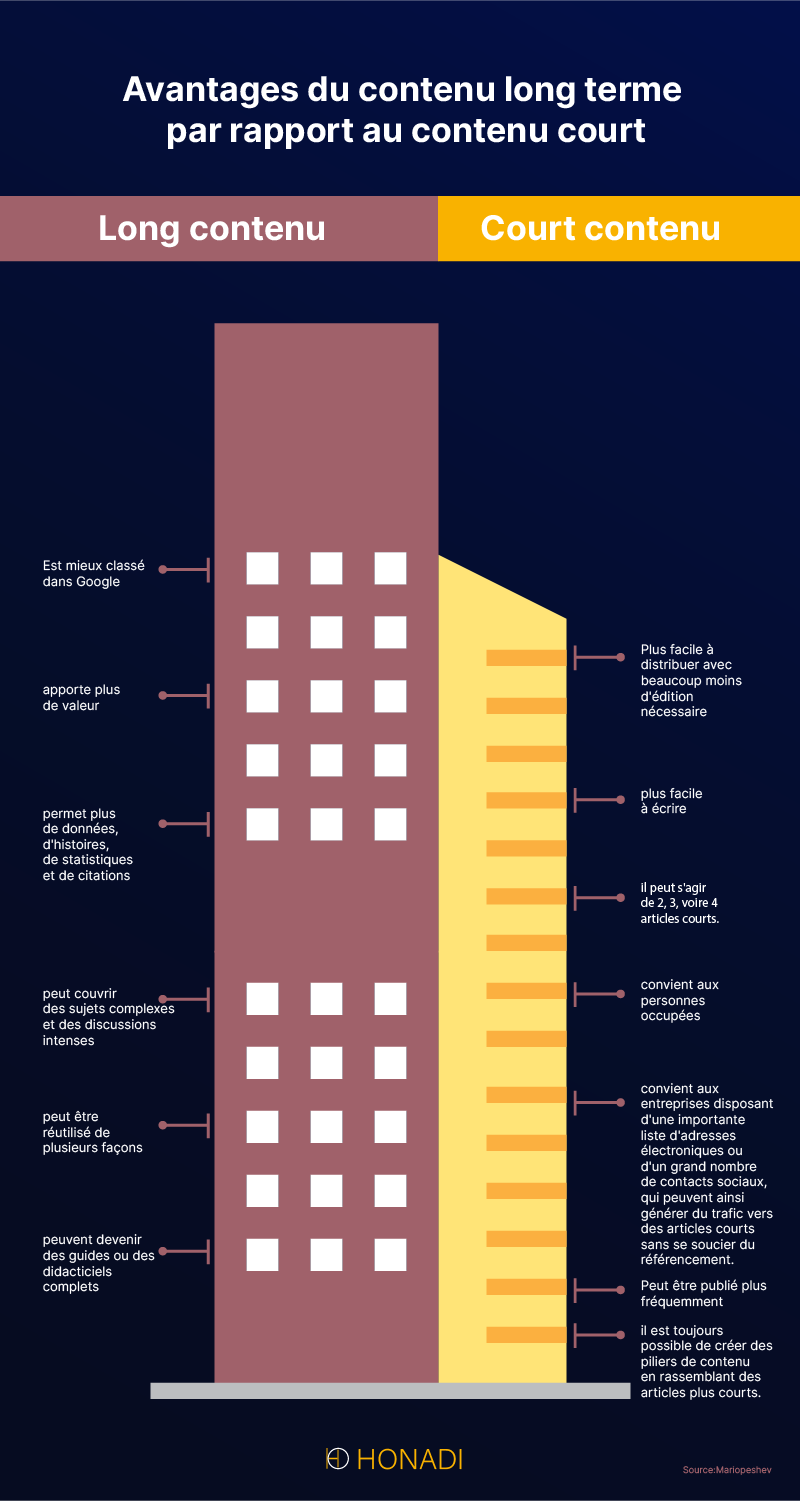
Now, let’s take a look at some experts in the marketing field to get an idea of how they do it.
Chapter 2: What do experts and statistics say about how many words a blog post should contain?
In this chapter, we will mainly go through analyzes and statistics from authority resources. This will allow us to know how experts handle this dilemma. ????
2.1. OrbitMedia: Bloggers Get Higher ROI With Longer Content
OrbitMedia regularly organizes questionnaires and analyzes to better understand trends in the world of blogs.
One of their latest surveys on the number of words a blog post should contain revealed the following:
- In 2020, a blog article had an average of 1,269 words compared to 808 in 2014, an increase of 57% in 6 years.
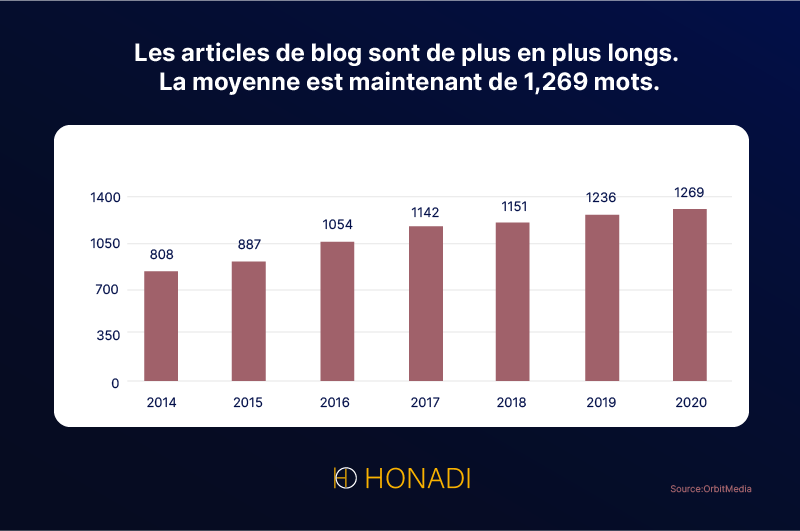
- While the number of articles of less than 500 words has drastically decreased, the number of people writing articles of more than 1000 words has increased.
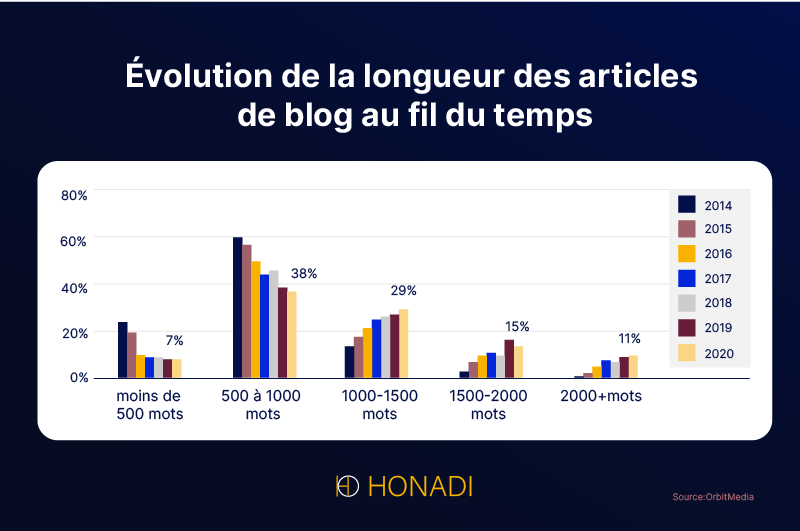
And if there is more and more enthusiasm for this type of content, it is because they do not fail to manage results:
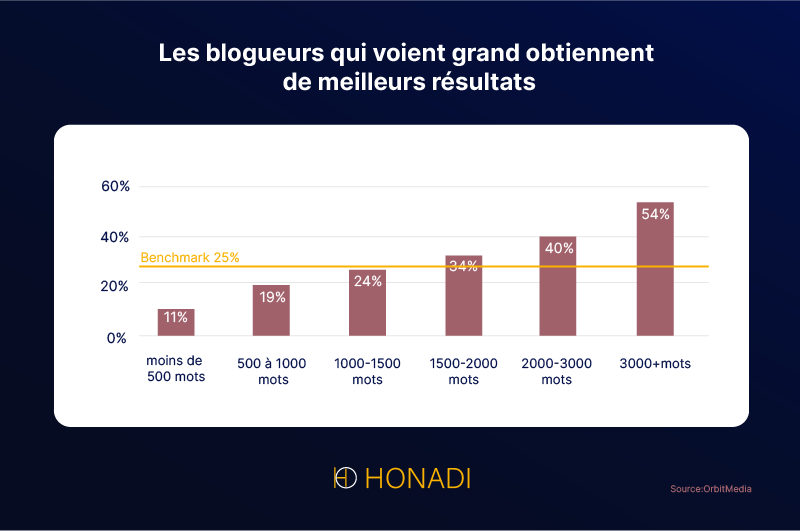
There is therefore no longer any doubt that according to this reference site, long content is to be favored in order to get maximum benefit from your content. ????
2.2. Hubspot: Optimal content length for traffic, shares and links is 2,250+
In order to discover the factors that allowed them to generate more traffic and shares, the Hubspot team reviews their own content and comes to these conclusions:
- Articles with a size between 2,250 and 2,500 words generate the most search traffic:
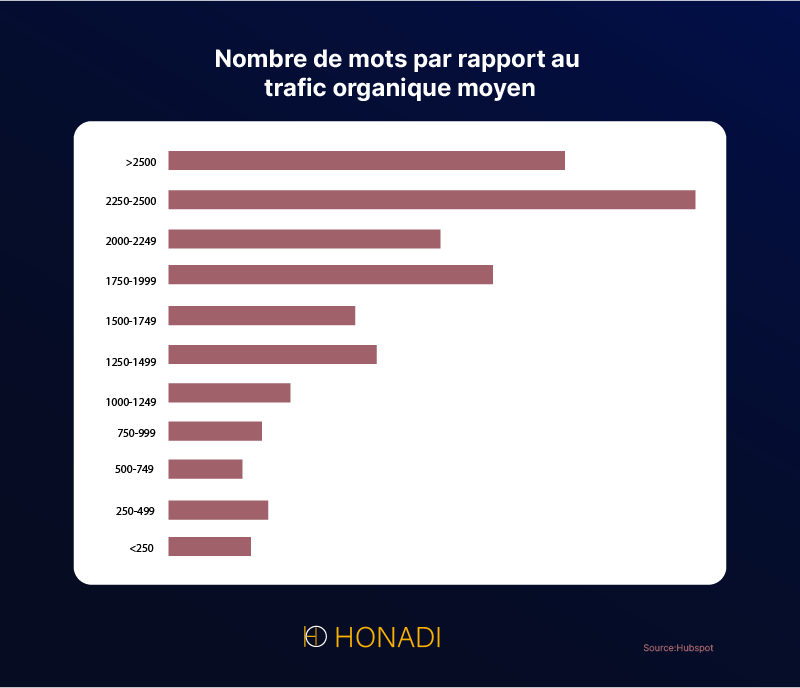
- Content of more than 2,500 words is the most shared and also provides the most backlinks:
For Hubspot, content that is between 2250 and 2500 words would be ideal to manage the most links, shares and traffic. Which is the complete opposite of content of less than 1000 words which achieves much less performance.
2.3. Team Yoast: Longer content is better if you have good writing skills
In their article On blog post length, the team behind the most popular wordPress SEO plugin, Yoast, gives the following advice:
- For an article to be considered and classified, it must contain at least 300 words. This is also the best recommendation that the plugin gives us during a content check;
- The blog contents of more than 1,000 words are more likely to receive ranking rewards from search engines. More content means Google can better understand what your post is about, helping it rise in search rankings;
- However, the size depends on the content types:
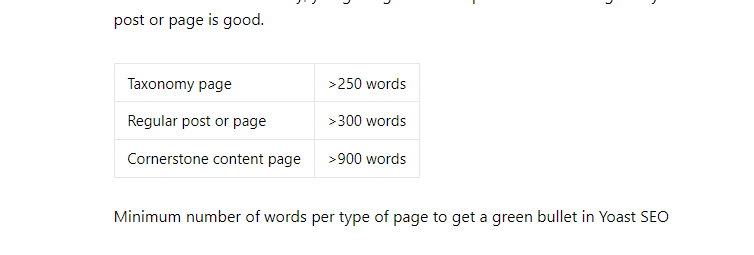
- But first of all, you must have in-depth skills in terms of web writing to guarantee the quality of the article when it is long.
Therefore, the Yoast team recommends having articles longer than 300 words, but adds that it is from 1,000 words that the results really stand out.????
2.4. Backlinko: Content on the first page of Google search results has an average of 1,890 words
To find out what leads to better rankings, Backlinko examine millions of Google search results and this is what comes out:
On the question of how many words a blog post should contain, he estimates that posts that appear on the first page of Google search results contain an average of 1,890 words:
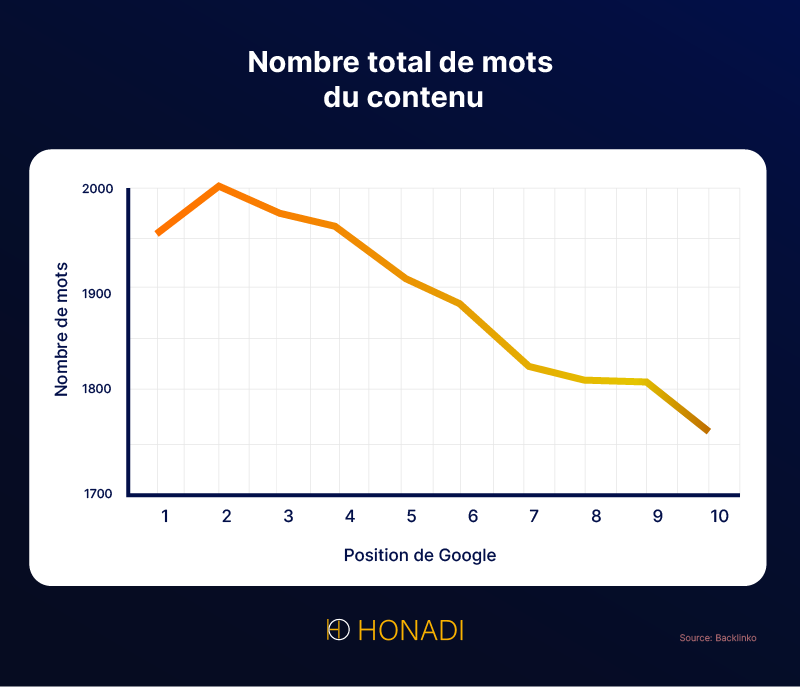
He then adds:
‘’Most of the time, long content ranks easily and faster than short content’’.
For Brian Dean, it is relevant to create articles with at least 1,890 words to optimize their chance of being among the first results on Google. What do you think about that ? ????
2.5. Moz/BuzzSumo: Opt for a minimum of 1,000 words
Still on the question of the optimal length of a blog post, the experts at Moz, in complicity with the BuzzSumo team, leaned their analysis on several websites and here’s what they discovered:
An article longer than 1,000 words receives more links and shares than shorter articles:

You can see that of all the content that is online, 85% of it is less than 1,000 words. Therefore, if you exceed this threshold, you are more likely to gain social media shares and search engine rankings. It gets even more interesting when you write articles beyond 2,000 words.
2.6. OkDork/BuzzSumo: Shoot for over 2,000 words per article
In order to concretely discover the factors that make content go viral, the founders of BuzzSumo conducted a study out of 100 million items. Part of their conclusion was:
- A longer article is more shared. Articles of 3,000 to 10,000 words performed exceptionally well;
- There were 16 times more blog posts with word counts under 1,000 than content over 2,000 words. Therefore, if you want to have a chance of your articles going viral, aim for at least 2,000 words per article.
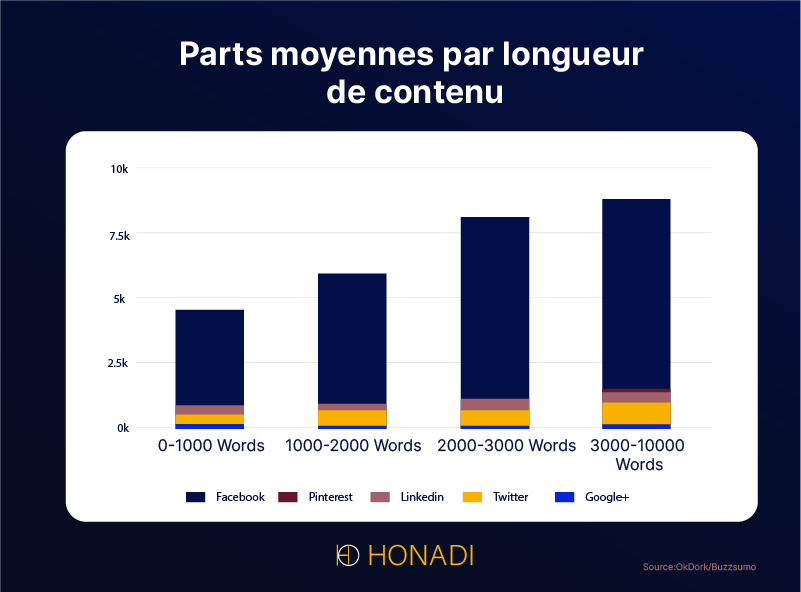
If you need more social shares to achieve your marketing objectives, it would therefore be relevant to “shoot” on articles of more than 2,000 words. ????
2.7. Medium: The ideal reading time for content is 7 minutes
The Medium publishing platform cares a lot about reader engagement. In order to keep readers on the web pages for as long as possible, they conducted a study on the optimal length of blog posts and here is what they bring us as a result:
- A blog post should have an average of seven minutes of reading time. After this time passes, reader engagement becomes lower and lower. According to Buffer, this reader engagement time covers approximately 1,600 words;
- Medium cautions that this is just an estimate, as they found a wide variation in their results. However, they recommend writing as many words as necessary to present your message.
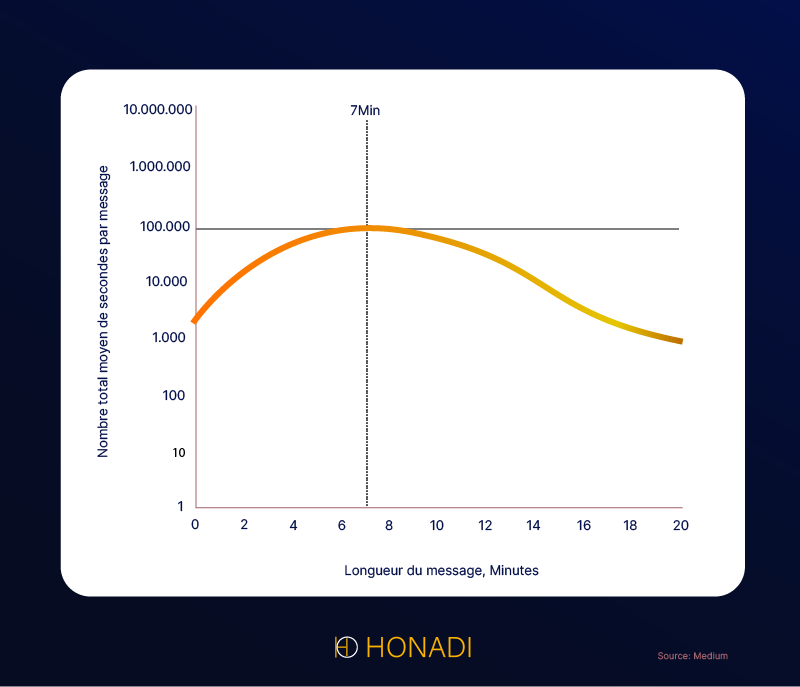
2.8. CoSchedule: Top-rated content has at least 2,000 words
In addition to sharing with us the results on the ideal length of content from different sites in this handy infographic, CoSchedule also published the findings of a study which focused on the ten highest-ranking articles on their own blog.
The most shared content ranked among the top 3 on Google has an average of 4,066 words. The minimum length of an article is 2,000 words.
However, they add that length alone is not enough, quality and relevance also matter.
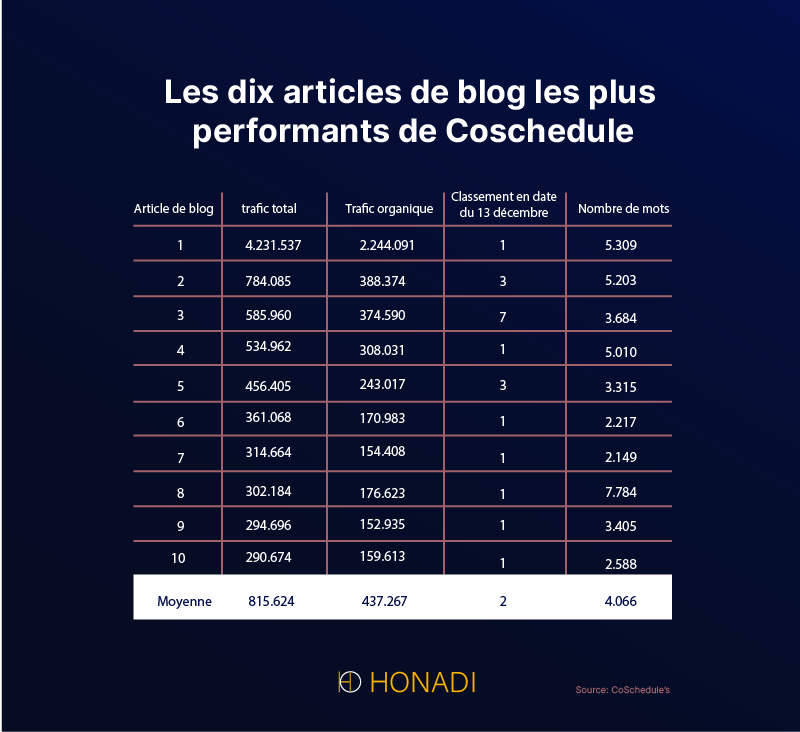
If you want to do something like CoSchedule and get as much traffic as possible, it would be wise to think about increasing the volume of your articles. Ready to create content longer than 4,000 words? ????
The experts are clear enough, you need long content (+ 1000 words) to generate traffic, shares and backlinks. But we all agree that there may be factors that will or will not play an important role in the volume of each text.
Here is a chapter specially devoted to this question. ????
Chapter 3: What factors can influence the length of a blog post?
There are factors that can influence the length of a blog post. Let’s try to see some.
3.1. The 5 main factors determining the length of an article
The first factor :
3.1.1. The length of a blog post depends on each industry
In some industries, longer articles may be the norm, while other professions may thrive with shorter articles. This is usually because the complexity of the topic and reader habits can change from one niche to another.
Web marketing specialist Neil Patel, thanks to his own experiences, spoke out on the subject.
In son article on the subject, he recommends not only a good length for blog articles, but also a good quality of content. Length and quality are two factors that determine the performance of a blog article.
But according to his analyses, the ideal number of words for a blog article is not the same depending on each industry.
Here is what we can note:
- FinTech : 2 000 – 2 150 ;
- Finances : 2 100 – 2 500 ;
- Fabrication : 1 700 – 1 900 ;
- Sales: 2,500 – 2,700;
- Retail: 1,500 – 1,700;
- Real estate: 1,800 – 1,900;
- House and garden: 1,100 – 1,200;
- Technology: 800-1000;
- Gadget : 300 – 500 ;
- Marketing/Advertising: 2,500 – 3,000;
- Health: 2,000 – 2,150;
- Mode : 800 – 950 ;
- Recruitment: 900 – 1,000;
- Food: 1,400 – 1,900;
- Voyage : 1 500 – 1 850 ;
- Cinema: 1,500 – 1,700.
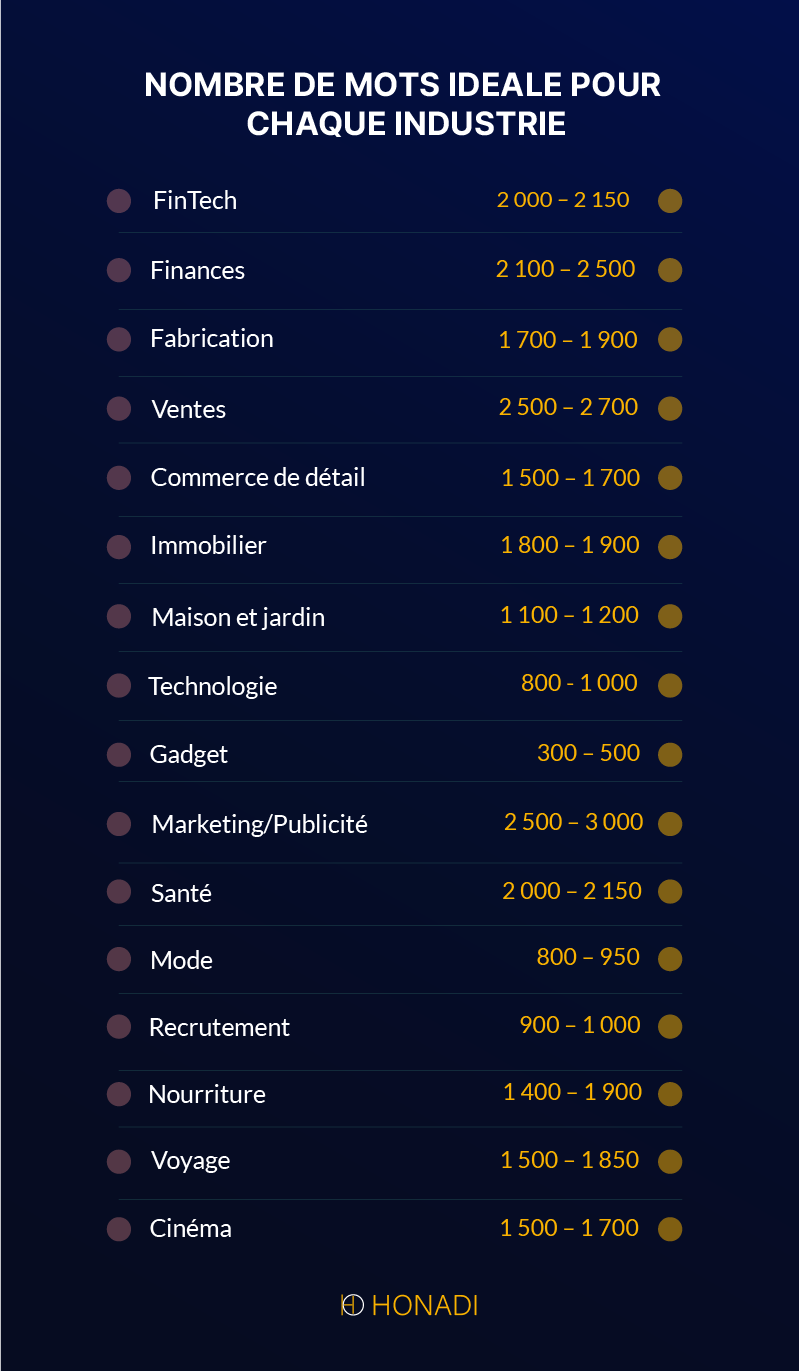
As Neil Patel notes, the business with the highest ideal word count is the sales industry, which generally prefers posts of 2,500 to 2,700 words.
Gadget-related blogs, on the other hand, tend to thrive with posts of just 300 to 500 words.
For most industries, however, the ideal blog post length tends to be between 1,500 and 2,000 words.
Depending on the industry you are in, do you think these word volumes are realistic? Mine which concerns marketing/advertising seems very relevant????
Share your thoughts with me in the comments!
3.1.2. The length of an article depends on the purpose of your blog
Your specific goals can influence the ideal length your blog posts should be.
Goal 1: How long should a blog post be if your goal is to engage with readers and create content they will want to read?
According to Medium, blog success should not be based on how many times a blog post is visited, but rather on how long readers stay to consume the content.
If your blog is more focused on building a strong community and a better relationship with your customers, user engagement will likely be your goal.
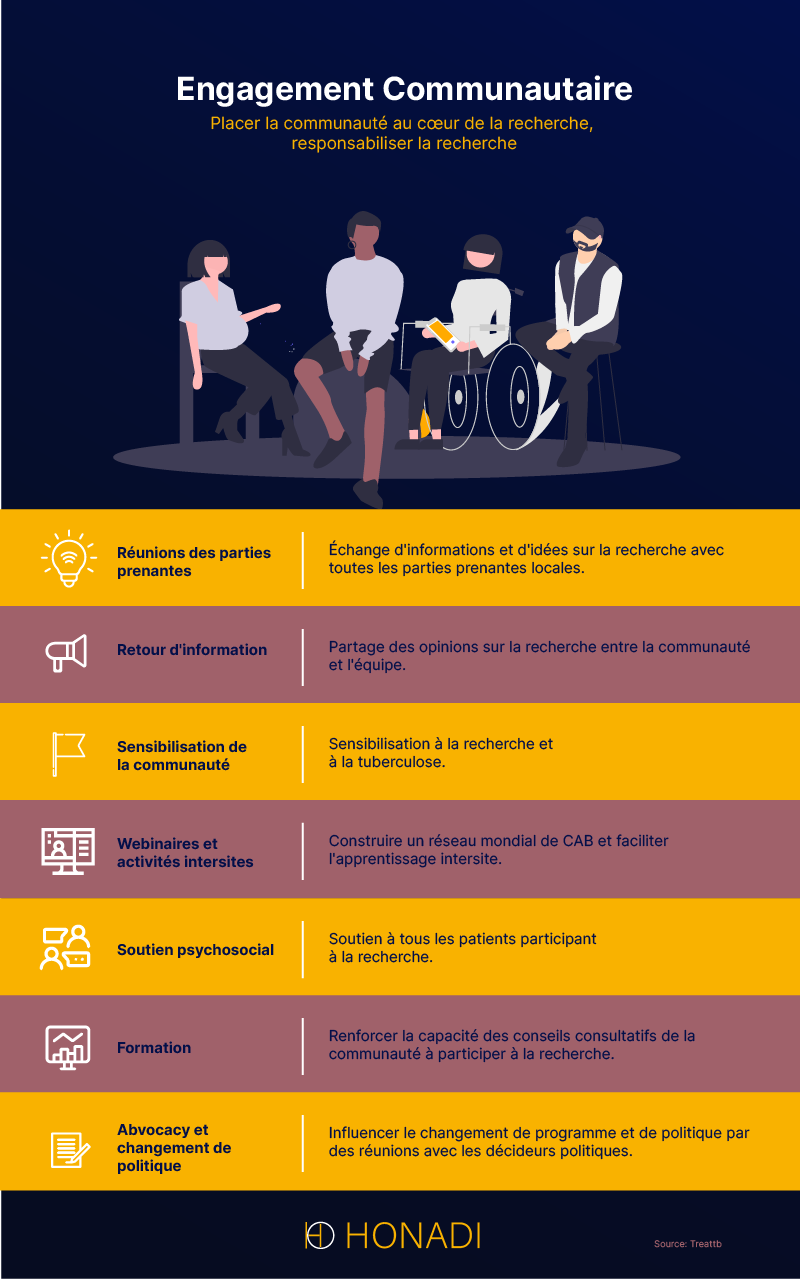
As we traced above, Medium found that the ideal post should take around seven minutes to read. In terms of length, that’s about 1,600 words.
Goal 2: How long should a blog post be if your goal is to create linkable, shareable content to improve your social media performance?
A blog can be a great way to create buzz around your social media accounts and improve your online presence as a brand.
For some digital marketers, this may be the main reason to start a blog.
According to the statistics from the previous chapter, articles with a size of 2,000 words and above tend to get the most shares and backlinks. ????
Objective 3: How long should a blog post be if your goal is to make a press release or keep your audience informed of current events?
The goal is to always keep your content relevant and qualitative. So, adding thousands of words if the main part of your message is only 500 words will do you no good.
On the contrary, you will provide a poor reading experience with information that is of no value to the topic you are communicating on. What you absolutely must avoid!
For news content, you don’t need 5,000 or 10,000 to get your message across. You are simply going to state certain facts and you must use the number of words that suits your content.
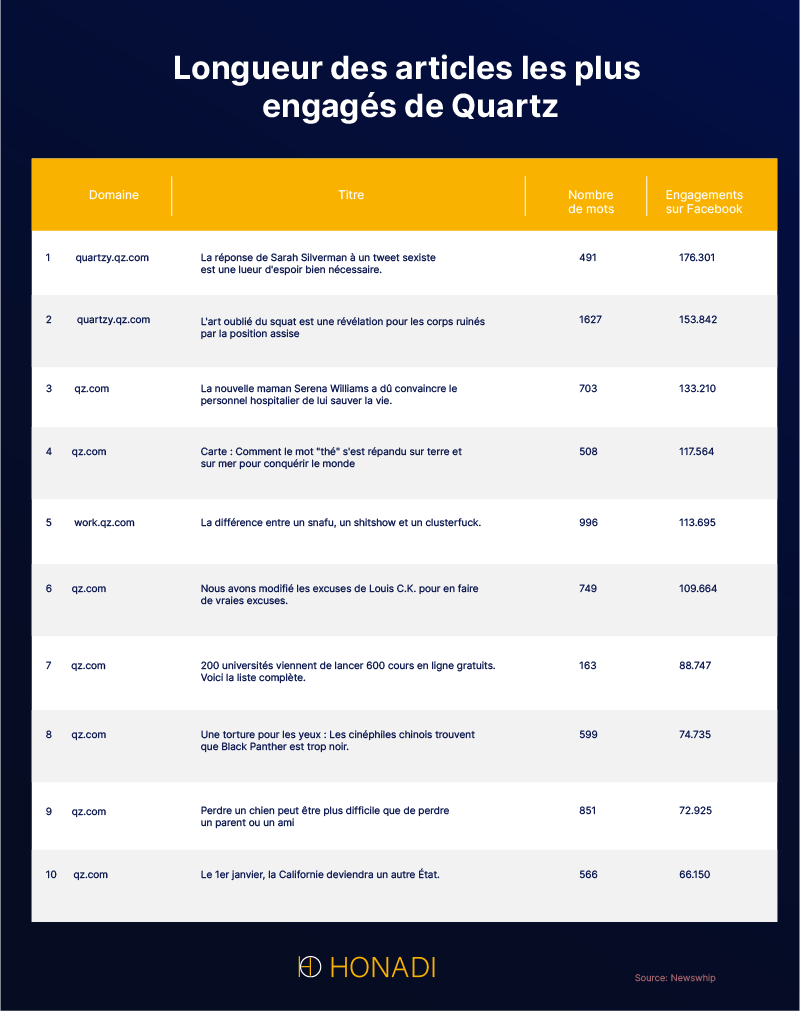
Shorter articles can sometimes address your needs and topic better than longer articles. If you write light personal articles, for example, the length of your article can sometimes be much shorter.
However, make sure to avoid posts under 300 words, as this is considered too light content.
Always keep in mind that it’s the combination of relevance and quality that makes great content. Not one without the other????
If you are pursuing several objectives, you have the possibility of creating these different types of content with varying volumes of words. So don’t feel stuck to a particular type of content.
3.5. The length of an article also sometimes depends on your preference
And yes ! It is also important to do what you like ????. Statistics exist to guide our decisions and the word count of blog posts is not a number set in stone.
If you run a personal blog where you regularly share content that they like with your audience, then continue!
Do not add a word count constraint that will negatively affect the consistency of your writing. Imagine Victor Hugo adding more words to a poem as famous as “Tomorrow, from dawn”? ???? This might get a little ugly, right?
You can therefore have your preferences, but it is when you intervene on competitive subjects that it becomes wise to make a compromise in order to best optimize the performance of your content.
Create content of 300 words while your competitors are more than 1500 words on the same subject… Your article risks not going very far in the Google SERPs????
My advice would be to consider the different factors listed in this chapter in order to choose the word volume that best suits your strategy.
3.2. What can we remember about the ideal word count for a blog post?
The question of how many words should a blog post contain is important for your content marketing. After all, creating content is an investment and it’s only natural to expect a return.
So, what can we really learn from all this? Here’s a quick recap of everything we just saw.
- Up to 300 words: They are considered very short articles and good for discussions. But they are bad for SEO by also generating fewer shares and backlinks.
- 300-800 words: This interval corresponds to the standard size recommended by experts in the field of blogging. Unlike the previous articles, these receive a few more social shares, but are less SEO qualified with very few backlinks.
- 800-1500 words: When these articles are well-written and actually address readers’ problems, they arguably get more social shares. They also tend to rank well on the first page of search engine results with slightly more backlinks than the previous type of content.
- 1500-2500 words: This is the size of content that most often occupies the top positions in Google and other search engines. To gain positioning, shares and backlinks, it is therefore recommended to write articles at this level without sacrificing quality of course.
- More than 2500 words : This is authoritative content when the quality is impeccable. Since they are difficult to create, they attract a significant number of shares and backlinks, especially when they provide original information. Once in the top positions, this type of content is difficult to outperform as it positions on several similar keywords because of its rich semantic field.

You now have a small comparison of content performance based on their volume. Coupled with the factors listed in this chapter, you now have concrete elements on which you can base your decision on the word count of your content. ????
In summary !
The ideal post length can depend on a number of factors, including your business goals and industry.
For SEO purposes, we recommend sticking to articles that are between 1,500 and 2,500 words.
Having such blog posts should satisfy your readers without making them feel like the content is too long.
In addition, you give a maximum chance for your content to position itself better in the SERPs and at the same time generate a significant number of shares and backlinks.
And there we are, we are at the end of this article! At your level, what do you consider to be short, medium and long content? And what is your opinion on the ideal word count for a blog post? Share everything with me in the comments!


